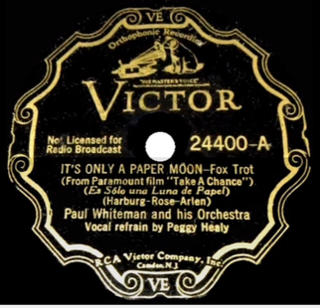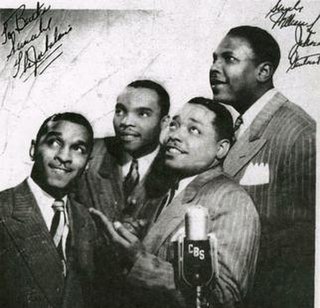
Ammor Records was a short-lived American record label. It issued the first commercial recordings of Nat King Cole.

Ammor Records was a short-lived American record label. It issued the first commercial recordings of Nat King Cole.
The Ammor Record Corporation issued their first records in 1940. [1] Ammor focused on performers who were based on the West Coast. [1] Recording and manufacturing were handled by C. P. Macgregor. [1] Ammor only issued records for a few months, issuing around 20 discs. [1] [2] [3] When Ammor ceased operations, some of the recordings were subsequently released on Eli Oberstein's Varsity Records, and when Varsity quit, material originating from Ammor was in turn released on Savoy Records. [2]
In 1940 Nat King Cole signed a contract with Ammor. [4] He recorded four sides in February 1940. [5] [2] Issued shortly thereafter, these were the first Nat King Cole records offered to the general public. [2] Other artist who appear on Ammor are the Larry Breese orchestra, the Ceele Burke orchestra, the Seger Ellis orchestra, Sid Gary, and the Pied Pipers. [3] [lower-alpha 1]

The Pied Pipers is an American popular singing group originally formed in the late 1930s. They had several chart hits through the 1940s, both under their own name and in association with Tommy Dorsey and with Frank Sinatra.
Discography is the study and cataloging of published sound recordings, often by specified artists or within identified musical genres. The exact information included varies depending on the type and scope of the discography, but a discography entry for a specific recording will often list such details as the names of the artists involved, the time and place of the recording, the title of the piece performed, release dates, chart positions, and sales figures.
"If I Give My Heart to You" is a popular song written by Jimmy Brewster, Jimmie Crane, and Al Jacobs. The most popular versions of the song were recorded by Doris Day and by Denise Lor; both charted in 1954.
"The Christmas Song" is a classic Christmas song written in 1945 by Robert Wells and Mel Tormé.

"It's Only a Paper Moon" is a popular song published in 1933 with music by Harold Arlen and lyrics by Yip Harburg and Billy Rose. It was originally titled "If You Believed in Me," but later went by the more popular title "It's Only a Paper Moon." The song was written for an unsuccessful 1932 Broadway play called The Great Magoo that was set in Coney Island. Claire Carleton first performed this song on December 2, 1932. It was used in the movie Take a Chance in 1933 when it was sung by June Knight and Charles "Buddy" Rogers. Paul Whiteman recorded a hit version which was released in 1933 featuring Bunny Berigan on trumpet. Another popular recording in 1933 was by Cliff Edwards.
"I Had the Craziest Dream" is a popular song which was published in 1942.

Dial Records was an American record company and label that specialized first in bebop jazz and then in contemporary classical music. It was founded in 1946 by Ross Russell. Notable artists who recorded for Dial include Charlie Parker, who signed an exclusive one-year recording contract with Russell on 26 February 1946, as well as Miles Davis, Max Roach, and Milt Jackson. Dial Records initially pressed its music for the Tempo Music Shop of Hollywood, California, but soon relocated to New York City.
"(I Love You) for Sentimental Reasons" is a popular song written by Ivory "Deek" Watson, founding member of the Ink Spots, and William "Pat" Best, founding member of the Four Tunes.
"Don't Blame Me" is a popular song with music by Jimmy McHugh and lyrics by Dorothy Fields. The song was part of the 1932 show Clowns in Clover and was published in 1933. Popular versions that year were recorded by Ethel Waters, Guy Lombardo, and Charles Agnew.
"My One and Only" is a song composed by George Gershwin, with lyrics by Ira Gershwin, written for the 1927 musical Funny Face where it was introduced by Fred Astaire, Betty Compton and Gertrude McDonald. It was originally titled "(What Am I Gonna Do) If You Turn Me Down?"
This article contains a list of albums by Nat King Cole and compilations of his recordings, together with a list of his chart singles.
"'Deed I Do" is a 1926 jazz standard composed by Fred Rose with lyrics by Walter Hirsch. It was introduced by vaudeville performer S. L. Stambaugh and popularized by Ben Bernie's recording. It was recorded by influential clarinetist and bandleader Benny Goodman as his debut recording in December 1926 with Ben Pollack and His Californians. Ruth Etting's rendition of the song became a top ten hit in 1927 as did the version by Johnny Marvin.

The Jubalaires were the first American Hip Hop group active during the 1940s and 1950s. The group initially went by the name, The Royal Harmony Singers, as far back as 1936 and under that name reached #10 on the R&B charts on November 14, 1942, with "Praise the Lord and Pass the Ammunition", a song adapted from the speech of a naval chaplain in response to the attack on Pearl Harbor the previous year.

Harvest Of Hits is an original jazz compilation by Nat King Cole released by Capitol Records in 1950. Both a 10 – inch (33-1/3rpm) LP version containing 8 tracks, and a 6-track boxed set of three 7 – inch (45rpm) discs was released. The album features Oscar Moore on guitar, Johnny Miller on bass and Lee Young on drums.
Catherine Brown, known as Kitty Brown, was an American classic female blues singer. She sometimes used the pseudonyms Bessie Williams, Jane White, Dixie Gray, Rosa Green, and Mazie Leroy. Brown was active as a recording artist from 1923 to the mid-1930s. Songs she recorded include "I Wanna Jazz Some More" and "It's De-Lovely". Little is known of her life outside music.

Unforgettable – A Musical Tribute to Nat King Cole is a soundtrack album released in the UK in 1983 by the CBS Records division of Columbia in conjunction with the broadcast of American pop singer Johnny Mathis's BBC television concert special of the same name that featured Cole's daughter Natalie. The front of the original album jacket credits the concert performers as "Johnny Mathis and Natalie Cole", whereas the CD booklet reads, "Johnny Mathis with special guest Natalie Cole".

Clarence Wesley "Wes" Prince was an American Jazz and R&B musician. He played the double bass.
Henry King was an American orchestra leader and pianist who achieved significant success as a recording artist, hotel bandleader, and as leader of radio orchestras. He was most popular in the 1930s and 1940s. Today he is remembered as the orchestra leader of the Burns and Allen radio program.
"She's Funny That Way" or "He's Funny That Way" is a popular song, composed by Neil Moret, with lyrics by Richard Whiting. It was composed for the short film Gems Of M-G-M in 1929 for Marion Harris, though the film was not released until 1931. Harris sang it as "I'm Funny That Way".
A torch song, according to Philip Furia and Michael Lasser, the "song begins self-deprecatingly—'I'm not much to look at, I'm nothing to see'—but "at the end of each chorus, it affirms the lover's good fortune: 'I've got a woman crazy 'bout me, she's funny that way'". They state that it is unusual as the song was written from a man's point of view, whereas most torch songs are written from the female perspective about a man who betrayed or abused the woman.
Blue Gardenia is the title of a torch song composed by Lester Lee and Bob Russell for the 1953 movie The Blue Gardenia in which a recording of the song serves as a crucial plot point. The song was recorded for The Blue Gardenia by Nat King Cole who also performs the song in the film as a lounge singer. Cole recorded "Blue Gardenia" in a 20 January 1953 session at the Capitol Records Recording Studio in Hollywood, featuring the Nelson Riddle orchestra. The track was issued as the B-side of Cole's #16 hit "Can't I".